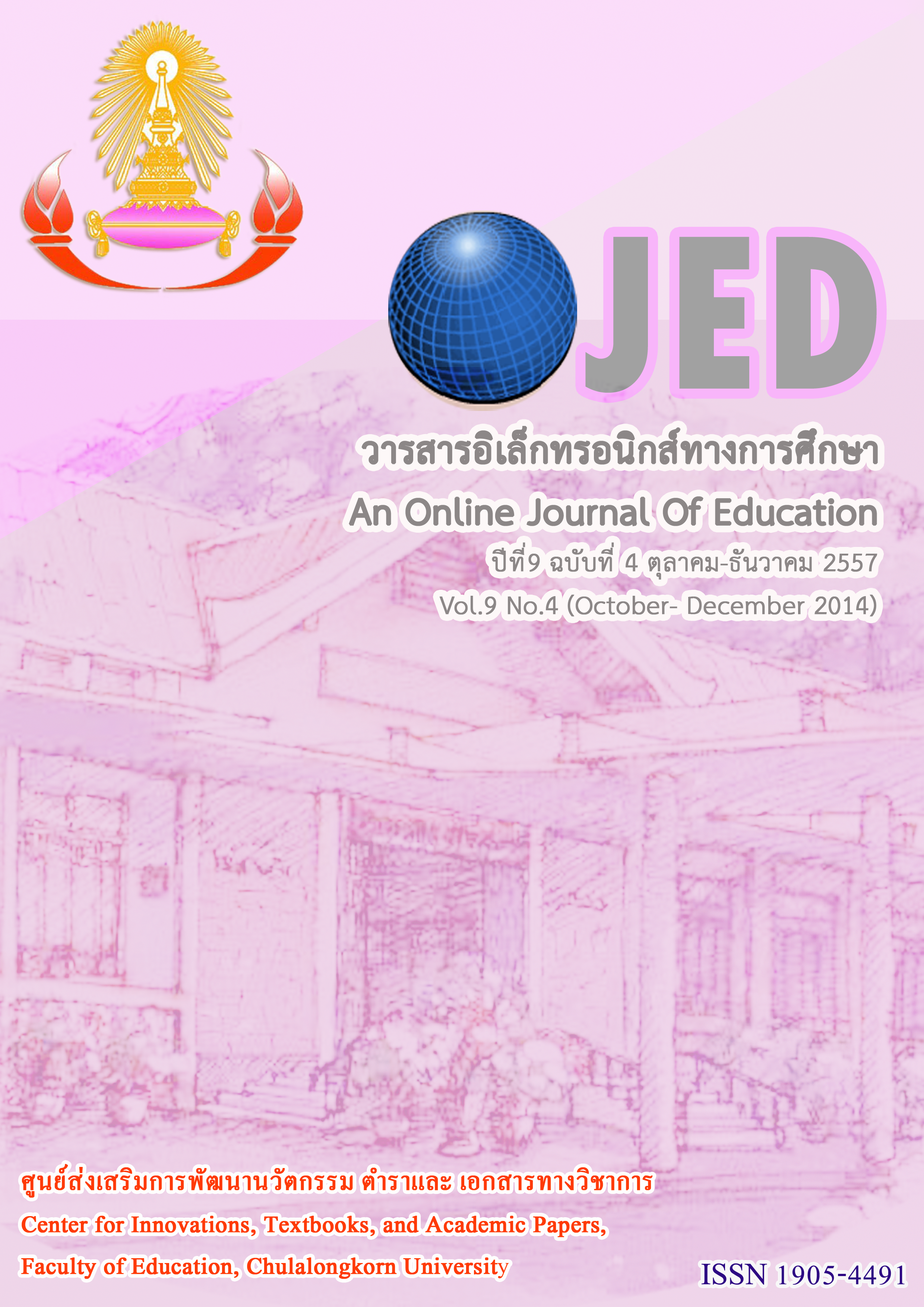ผลของการจัดกิจกรรมดนตรีตามแนวคิดมิวสิคฟอร์ลิตเติ้ลโมสาร์ทที่มีต่อความสามารถในการเคลื่อนไหวประกอบจังหวะของเด็กอนุบาล
Keywords:
กิจกรรมดนตรี, แนวคิดมิวสิคฟอร์ลิตเติ้ลโมสาร์ท, ความสามารถในการเคลื่อนไหวประกอบ, MUSIC ACTIVITIES, MUSIC FOR LITTLE MOZART APPROACH, RHYTHMIC ABILITYAbstract
การวิจัยครั้งนี้มีวัตถุประสงค์เพื่อ 1) ศึกษาผลของการจัดกิจกรรมดนตรีตามแนวคิดมิวสิคฟอร์ลิตเติ้ลโมสาร์ทที่มีต่อความสามารถในการเคลื่อนไหวประกอบจังหวะของเด็กอนุบาลกลุ่มทดลองก่อนและหลังการทดลอง 2) ศึกษาผลของการจัดกิจกรรมที่มีต่อความสามารถในการเคลื่อนไหวประกอบจังหวะของเด็กอนุบาลระหว่างกลุ่มทดลองที่ได้รับการจัดกิจกรรมดนตรีตามแนวคิดมิวสิคฟอร์ลิตเติ้ลโมสาร์ท และกลุ่มควบคุมที่ได้รับการจัดกิจกรรมเคลื่อนไหวและจังหวะแบบปกติ กลุ่มตัวอย่างที่ใช้ในการวิจัย คือ เด็กอนุบาลชั้นปีที่ 2 ปีการศึกษา 2556 โรงเรียนอนุบาลนนทบุรี สังกัดสำนักงานเขตพื้นที่การศึกษาประถมศึกษานนทบุรี เขต1 จำนวน 30 คน สุ่มตัวอย่างโดยการใช้วิธีการสุ่มอย่างง่ายด้วยวิธีการจับฉลาก และจับคู่ (Match Pair) โดยใช้เกณพ์ เพศ และ อายุ แบ่งเป็นกลุ่มทดลอง จำนวน 15 คน และกลุ่มควบคุมจำนวน 15 คน ระยะเวลาที่ใช้ในการวิจัย 10 สัปดาห์ สัปดาห์ละ 3 วัน เครื่องมือที่ใช้ในการวิจัย คือ แบบวัดความสามารถในการเคลื่อนไหวประกอบจังหวะ วิเคราะห์ข้อมูลโดยการหาค่าเฉลี่ย ส่วนเบี่ยงเบนมาตรฐาน และการทดสอบค่าที
ผลการวิจัย เป็นดังนี้ 1) หลังการทดลอง กลุ่มทดลองมีค่าเฉลี่ยของคะแนนความสามารถในการเคลื่อนไหวประกอบจังหวะสูงกว่าก่อนการทดลองอย่างมีนัยสำคัญทางสถิติที่ระดับ .05 2) หลังการทดลอง กลุ่มทดลองมีค่าเฉลี่ยของคะแนนความสามารถในการเคลื่อนไหวประกอบจังหวะสูงกว่ากลุ่มควบคุมอย่างมีนัยสำคัญทางสถิติที่ระดับ .05
The purposes of this research were 1) to study the effects of organizing music activities based on Music for Little Mozart approach on rhythmic ability of kindergarteners before and after the experiment of the experimental of a group of children, and 2) to study the effects of organizing an activity on rhythmic ability of kindergarteners between an experimental group which used music activities based on the Music for Little Mozart approach and a control group which used movement and rhythmic activity based on early childhood curriculum. The sample included 30 K2. children in 2013 academic year from Anubannontaburi school under the Primary Educational Service Area Office of Nonthaburi. Random sampling and match pairing according to age and gender were used to divide children into two groups, 15 children each in both the experimental group and the control groups. The research duration was 10 weeks, 3 days per week. The research instrument was the rhythmic ability test. The data were statistically analyzed by using 10 weeks, 3 days per week. The research instrument was the rhythmic ability test. The data were statistically analyzed by using the arithmetic mean, standard deviation, and t-test
The research results were as follows: 1) After the experiment, the experimental group had mean score of rhythmic ability higher than before the experiment at .05 significant level. 2) After the experiment, the experimental group had mean score of rhythmic ability higher than the control group at .05 significant level.




